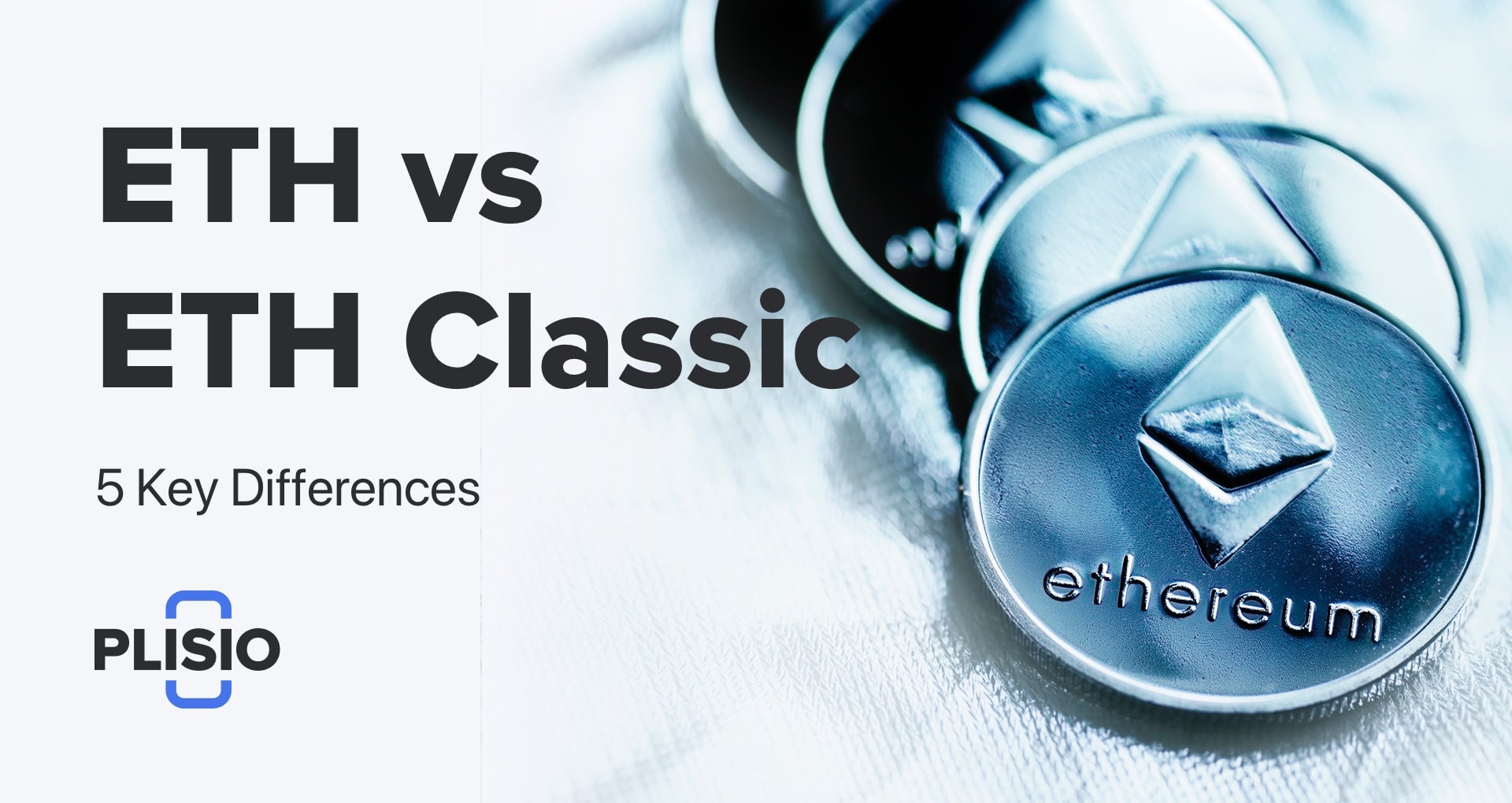Ethereum vs Ethereum Classic: 5 Key Differences

When looking to purchase Ethereum, it's possible to encounter two cryptocurrency blockchain networks with similar names: Ethereum and Ethereum Classic. Although both networks have their own native coins, ETH and ETC respectively, both referred to as "ether", they have significant differences.
Although Ethereum Classic and Ethereum share a common goal of creating smart contracts and decentralized applications, they differ in many ways. These differences include their mining activities, methods for changing transactions, limits on coin production and many others.
If you're unsure about which network best suits your interests and needs, we've outlined the key differences between ETH and ETC to help you get a better understanding of these two cryptocurrencies. Let’s dive in.
What is Ethereum?
Ethereum is an open-source blockchain system and the second-largest cryptocurrency by market capitalization. It has its own native crypto called Ether and serves as a platform for several other cryptocurrencies while facilitating the execution of Decentralized Smart Contracts.
In 2013, Vitalik Buterin, along with his co-founder, described Ethereum in a white paper while securing the project funding through a public crowd sale in 2014. The Ethereum blockchain officially launched on July 30, 2015, and has undergone several updates since then, including the recent London Hard Fork update.
Developers can use the Ethereum programming language to build dApps for various purposes, such as financial services, gaming, NFTs, and more. These applications operate on smart contracts that execute when specific conditions are met.
Ether, produced on the Ethereum blockchain, is the currency used to run these dApps. The amount of Ether required for a smart contract varies based on its complexity. Developers receive new Ether for every block added to the ledger, as well as transaction fees collected from smart contracts. This encourages developers to use the platform to create dApps.
What is Ethereum Classic?
Ethereum Classic was created as a result of a hard fork in the main Ethereum blockchain after a hack on the network's DAO in 2016. The original chain containing the hack's history was renamed Ethereum Classic, while the new chain salvaged from the hack was named Ethereum.
Ethereum Classic is a branch of Ethereum that focuses on preserving the original features of Ethereum. It uses the same consensus algorithm (Et-hash) as Ethereum, which allows it to continue to operate similarly to the previous version of Ethereum.
If you’re interested in working with either Ethereum or Ethereum classic, the Plisio cryptocurrency payment gateway has a great offer for small and medium sized businesses. You can easily sell your services or goods online and get paid with ETH or ETC - just integrate the Plisio API to your website and start accepting crypto payments with the lowest fee of just 0.5%.
As of now, Ethereum Classic is not compatible with any Ethereum updates, including hard forks. Its ticker symbol is ETC, and it operates under smart contracts, producing Ether under the ETC token name. ETC prioritizes a platform where users cannot modify transactions on a blockchain's history. This design ensures that people can track different trades made on the blockchain while keeping all information pseudonymous.
Key Differences between ETH and ETC
- Mining Process is different for Ethereum and Ethereum Classic. Ethereum Classic uses a proof-of-consensus mechanism similar to Bitcoin. Miners verify transactions on the blockchain to receive ETC rewards. Ethereum, however, has moved to a proof-of-stake consensus mechanism. Validators contribute their stakes to the mining process to add a new block to the chain and earn rewards.
- Immutability is a key feature of Ethereum Classic, which follows the original Ethereum system that promotes immutability. Users cannot alter transactions in the blockchain's history. On the other hand, Ethereum allows for prior transactions to be altered and adjusted through its platform.
- Potential Changes are possible for Ethereum as it is subject to various future changes. However, Ethereum Classic has decided to adhere strictly to Ethereum's original rules.
- Limit is not applicable to Ethereum anymore since it has moved to a proof-of-stake consensus mechanism. Validators contribute their stakes to the mining process to add a new block to the chain and earn rewards. Ethereum Classic, however, is limited to 230 million tokens.
- Value differs significantly between Ethereum and Ethereum Classic. Ethereum has a token price of approximately $1,600 and a market cap of almost $189 billion as of March 2023, making it the second-largest cryptocurrency after Bitcoin. Ethereum Classic, with a market cap of $2.99 billion and a token price of $20.3, which is significantly smaller.
Final Thoughts
As with any investment, both of these cryptocurrencies carry risk, and the cryptocurrency market has seen some extreme volatility in recent months. But as they go along separate paths, ETH and ETC continue to drift apart. Since Ethereum moved to PoS, the consensus mechanism differs for these two coins, as well as the blockchain potential for developers’ alterations and changes.
How to get started with Ethereum or Ethereum Classic
If you want to get started with either of the both cryptocurrencies, it is not necessary for you to buy it directly -- you can always accept it as payment for your business and services.The Plisio crypto payment gateway has the best business-oriented features, among which are low fees, easy integrations and customized mass payout options.
You will find 18 supported cryptocurrencies, ETC and ETH included, as well as 23 e-commerce plugin options for a business of any kind. Besides, if you’re looking for some private and balanced bookkeeping tools, it can also offer you some anonymity and a wide features range. Low fees and an easy crypto payments setup will pleasantly surprise you and your business future revenue.
